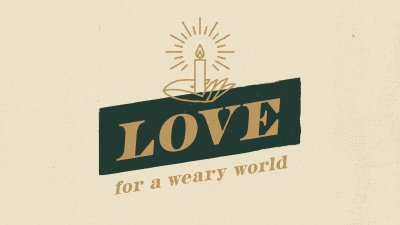


Week 4 - Love
Day 22 - 28
Day 22 - LOVE video intro
The word “love” is one of the sloppiest words in our language, as it primarily refers to a feeling that happens to a person. In the New Testament, “love” refers to a way of treating people that was defined by Jesus himself: seeking the well-being of others regardless of their response. READ 11 Beloved, if God so loved us, we also ought to love one another. 1 John 4:11


Day 23
When Jesus is asked about the most important command in the Old Testament, the Hebrew Bible, he answers by quoting from the ancient prayer known as the Shema, “love the Lord your God with all of your heart.” But that’s not all. Jesus quickly follows up by saying that another command from the Hebrew Bible is also the most important, “love your neighbor as yourself.” So which is most important? For Jesus, both are vital because the first command cannot be obeyed without heeding the second. They are inseparable. A person’s love for God is expressed by their love for others. READ 29 Jesus answered, “The most important is, ‘Hear, O Israel: The Lord our God, the Lord is one. 30 And you shall love the Lord your God with all your heart and with all your soul and with all your mind and with all your strength.’ 31 The second is this: ‘You shall love your neighbor as yourself.’ There is no other commandment greater than these.” Mark 12:29-31 5 You shall love the LORD your God with all your heart and with all your soul and with all your might. Deuteronomy 6:5 18 You shall not take vengeance or bear a grudge against the sons of your own people, but you shall love your neighbor as yourself: I am the LORD. Leviticus 19:18 REFLECT -Pay attention to what Jesus says after quoting from the Hebrew Bible. What questions, thoughts, or feelings come up for you as you reflect on his words? -Review the passages from Deuteronomy and Leviticus. What do you observe? How does this impact you today? -Turn your reflections into a prayer to God from your heart.


Day 24
The Hebrew Bible records the history of God’s people repeatedly neglecting the greatest commandment to love God and others. How can we hope to do any better? Jesus helps us when he adds a new commandment to accompany the greatest commandment. His new command shows how his own sacrificial love can empower his followers to love others. READ 34 A new commandment I give to you, that you love one another: just as I have loved you, you also are to love one another. John 13:34 29 Jesus answered, “The most important is, ‘Hear, O Israel: The Lord our God, the Lord is one. 30 And you shall love the Lord your God with all your heart and with all your soul and with all your mind and with all your strength.’ 31 The second is this: ‘You shall love your neighbor as yourself.’ There is no other commandment greater than these.” Mark 12:29-31 9 In this the love of God was made manifest among us, that God sent his only Son into the world, so that we might live through him. 10 In this is love, not that we have loved God but that he loved us and sent his Son to be the propitiation for our sins. 11 Beloved, if God so loved us, we also ought to love one another. 1 John 4:9-11 REFLECT -Compare John 13:34 with Mark 12:29-31. What is the difference between these two commands? How does Jesus’ own example renew/fulfill the greatest command? -Review 1 John 4:9-11. What words or phrases stand out to you? According to this passage, why did Jesus give his life, and what should motivate our love for others? -Take a moment to pray in response to what you learned today.


Day 25
The God of the Bible doesn’t just express love, he is love. As a triune God, Father, Son, and Spirit, he has always been and always will be an others-centered, self-giving, communal being. Love is not just one of his attributes. Love is the very nature of who he is. Jesus, the Son, fully embodies the love of God and demonstrates it most clearly when he gives his life on behalf of humanity. When people learn to trust Jesus’ love for them, they join in God’s community of love, and their very nature is transformed to love others with him. READ 8 Anyone who does not love does not know God, because God is love. 1 John 4:8 16 So we have come to know and to believe the love that God has for us. God is love, and whoever abides in love abides in God, and God abides in him. 1 John 4:16 16 By this we know love, that he laid down his life for us, and we ought to lay down our lives for the brothers. 1 John 3:16 9 As the Father has loved me, so have I loved you. Abide in my love. 10 If you keep my commandments, you will abide in my love, just as I have kept my Father’s commandments and abide in his love. 11 These things I have spoken to you, that my joy may be in you, and that your joy may be full. 12 “This is my commandment, that you love one another as I have loved you. 13 Greater love has no one than this, that someone lay down his life for his friends. John 15:9-13 REFLECT -Review 1 John 4:16. Have you learned to trust that God truly loves you? -If so, describe your experience of receiving his love. What has changed in your life since you began to fully trust that God loves you? How can you share his love with someone today? -If not, describe how you have struggled to receive God’s love for you. What do you think would change in your life if you fully trusted that God loves you? -Review John 15:9. How much do you think God loves Jesus? Reflect on the idea that Jesus loves you just as much. What questions, thoughts, or feelings come up? -Jesus compared his love to a place that you can live or “abide” in. To truly live somewhere, you first must move in, unpack, learn the space and how to operate comfortably in it. What else do you do when you live somewhere? How can this compare to what it’s like to trust in Jesus’ love for you? -Let your reading and reflection prompt a prayer. Talk to God about how his love amazes you, be honest about how you struggle to receive it, and ask for what you need to trust his love for you today.


Day 26
Agape love is not primarily a feeling that happens to people. Love is an action. It is a choice people make to seek the well-being of others. The apostle Paul, in one of his letters, says love is more important then having spiritual knowledge or special abilities and that nothing really matters without it. He goes on to describe exactly how love thinks and behaves. READ 1 If I speak in the tongues of men and of angels, but have not love, I am a noisy gong or a clanging cymbal. 2 And if I have prophetic powers, and understand all mysteries and all knowledge, and if I have all faith, so as to remove mountains, but have not love, I am nothing. 3 If I give away all I have, and if I deliver up my body to be burned, but have not love, I gain nothing. 4 Love is patient and kind; love does not envy or boast; it is not arrogant 5 or rude. It does not insist on its own way; it is not irritable or resentful; 6 it does not rejoice at wrongdoing, but rejoices with the truth. 7 Love bears all things, believes all things, hopes all things, endures all things. 1 Corinthians 13:1-7 REFLECT -Write out 1 Corinthians 13:4-7 on a piece of paper. As you write the passage in your own handwriting, what words or phrases especially stand out to you -Which aspects of love do you need to grow in most? Tell God and ask for his help. -Using Paul’s definition of love, consider how Jesus has loved you. For example, how has Jesus been patient, kind, humble, and selfless to you? -Who needs a reminder that God loves them today? How does Jesus want to share his love through you this week? Take some time to pray about it. Jot down ideas that come to mind while you pray and make a plan to actively share his love this week.


Day 27
Jesus says that the ultimate standard of authentic love is how well you treat the person you can’t stand, or in his words, “you should love your enemy and do good to them expecting nothing in return.” For Jesus, this kind of love imitates the very character of God himself. READ 27 “But I say to you who hear, Love your enemies, do good to those who hate you, 28 bless those who curse you, pray for those who abuse you. 29 To one who strikes you on the cheek, offer the other also, and from one who takes away your cloak do not withhold your tunic either. 30 Give to everyone who begs from you, and from one who takes away your goods do not demand them back. 31 And as you wish that others would do to you, do so to them. 32 “If you love those who love you, what benefit is that to you? For even sinners love those who love them. 33 And if you do good to those who do good to you, what benefit is that to you? For even sinners do the same. 34 And if you lend to those from whom you expect to receive, what credit is that to you? Even sinners lend to sinners, to get back the same amount. 35 But love your enemies, and do good, and lend, expecting nothing in return, and your reward will be great, and you will be sons of the Most High, for he is kind to the ungrateful and the evil. 36 Be merciful, even as your Father is merciful. Luke 6:27-36 REFLECT -What do you notice? What questions, thoughts, and feelings come up as you read? -Remember or tell a story of an experience you had when you, or someone you know, showed love to their enemy and expected nothing in return. -What does Jesus promise for those who love in this way (see verse 35)? -Note how God himself is kind to ungrateful and evil people. What does this say about God’s character? Imagine a world where God was mean to people who were ungrateful and evil. Would anyone at all survive? -Note how God is described in v 36. What is the relationship between love & mercy? -How do Jesus’ words specifically challenge or encourage you today? What is one way you can actively respond today? -Express your gratitude to God for his merciful love, and be honest about the ways you have withheld the same love from others. Pray for the people who have mistreated you, and ask for God’s continued help to love like he does.


Day 28
In Paul’s letters, he reflects on God’s love. He teaches about how it extends beyond the Jews to include the Gentiles and how nothing at all can separate God’s people from its measures. In one letter, Paul recognizes that Jesus’ love is so massive that people need supernatural help to understand and rely on it. Paul then prays for his readers to be strengthened with God’s Spirit. READ Ephesians 3:14-21, Romans 8:38-39 REFLECT -Read the passages of the day carefully. Pay attention to the words and metaphors Paul uses. What do you observe? -Have you ever wondered if you (or someone else) have sinned too much to receive the love of God? Our sin might be tall and deep, but Jesus’ love is taller and deeper Or in other words, where there is more sin than we can recall, Jesus’ love can forgive even more than we can fathom. We cannot earn God’s love; we can only humble ourselves to receive it. Who else needs a reminder of this good news today? -Turn your reflections into a prayer to God from your heart. Ask God to give you strength to understand and trust Jesus’ love for you and for others.
